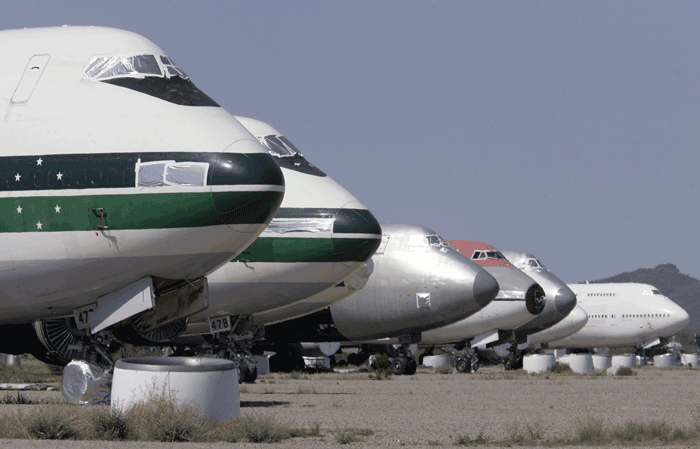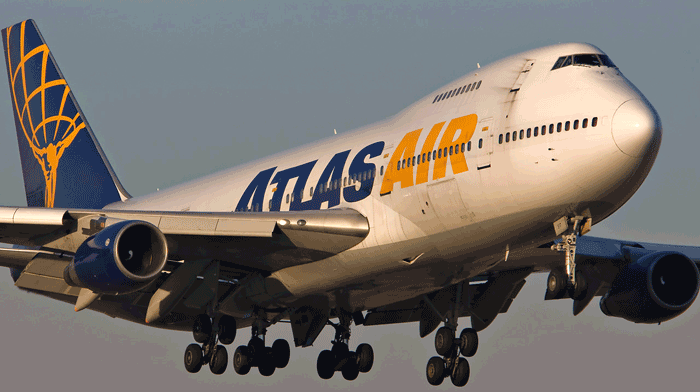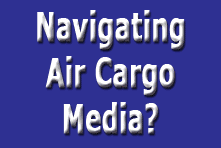
As reported here in early November, Evergreen
International Airlines Inc., the troubled McMinnville, Oregon-based cargo
carrier, flew its final military flight last week and all remaining aircraft
are now parked.
Evergreen is part of the U.S. flagged, all-cargo
charter carrier industry.
This segment of the airline business has
been highly dependent on the U.S. Government for its survival, especially
from the Civil Reserve Air Fleet (CRAF) program, and for revenue.
Since the demise of the U.S. all cargo scheduled
carriers, with Seaboard World Airlines taken over by Flying Tigers which
was then absorbed by Federal Express, the U.S. has lost its dominant position
in the scheduled all cargo industry while developing a leadership position
in the express industry.
But, with the reduction in U.S. Military
business after Iraq and now with the withdrawal from Afghanistan business
has dried up.
Now these all-cargo carriers need to regain
a dominant position in the commercial air cargo industry or more will
follow Evergreen and shut down in the future.
A question that arises from all this is
how can U.S. all-cargo carriers regain their position in the commercial
market and what changes will they have to undergo to achieve this goal?
 “Highly
doubtful,” proclaims respected logistics expert Issa Baluch. “Highly
doubtful,” proclaims respected logistics expert Issa Baluch.
“Competition has increased and is
very intense, with different components.
“Operating costs elsewhere in the
world are far below those of U.S. carriers.
“The notion of globalization did not
take hold in the U.S. as the legacy all-cargo carriers there continued
to depend primarily on the U.S. cargo and military contracts even as consignments
continued to diminish over time.
“Too many regulations also preclude
any comeback for U.S. all-cargo; in fact the U.S. has overloaded rules
and regs on their flag carriers while their counterparts elsewhere in
the world get a free ride.
“But most important to me is the excess
fat the U.S. carriers carry.
“Their operating costs are far higher
so that they cannot compete effectively.
“One solution I can offer is adjust
to ‘0’ budgeting every so often so you can knock off the non
essentials.
“But this alone is not enough.
“Just as in the case of manufacturing,
when jobs moved overseas from the USA, we can draw a similarity here too.
“When business moves overseas, we
have to do something to retain some of it.
“The solution is continuous adjustment
to our service/product offering.
“Some of the U.S. carriers moved quite
slowly in recognizing the effects of globalization and did not adjust
themselves fast enough.
“Also there is a saying widely believed
by many in the logistics industry: ‘Operators make more bounty in
areas they are least involved in.’
“Competitors to U.S. carriers make
money from airports, multi-modal transport, and anything or everything
they subcontract.
“So perhaps a view from a holistic
angle needs to take place, if the lot of the U.S. all-cargo flag carriers
is to change,” Issa Baluch concluded.
 |

An enlightened view is offered by Carsten
Peterson from Miami:
“It’s worth mentioning at the
onset here that Evergreen focused its business model on high-yield government
contracts only and never really catered to the commercial charter or ACMI
customers except for "empty leg flights" coming off military
missions, i.e. HKG return loads to the U.S. or Europe.
“Evergreen competition, i.e. Atlas
Air, Southern Air, Kalitta Air, and others always maintained a good mix
of commercial charters and wet leases to customers such as Emirates, British
Airways, Saudia, Qantas, Air New Zealand, DHL etc.
“Evergreen also separated themselves
from their competition by operating older, fuel inefficient, 747 classic
freighters and only upgraded their fleet to include -400 series aircraft
approximately two years ago.
“All of the -400s were recently repossessed
by the Lessors.
“This was an instrumental factor to
why they finally collapsed.
“Similarly, Global Aviation Holdings,
with their subsidiaries North American and World Airways both focused
on Military troops and cargo flights, has filed for Chapter 11 bankruptcy
protection twice in the past two years.
“GLAH's crews are highly unionized
and therefore also unable to compete in today's commercial market.”

 One way to maintain some balance is to saddle
up and go where much of the action is today.
One way to maintain some balance is to saddle
up and go where much of the action is today.
Based in busy Dubai, Lionel Smith, MD of
Air Cargo Integrators, has spent the past dozen plus years in the middle
of the charter action as a leading go-to resource when air cargo needs
to get anywhere.
Hands on, smart, and right down on the ground,
Lionel offers this view:
“Having been involved in the air cargo
segment in both theatres of operation, since 2002 in Afghanistan and 2004
in Iraq, I think the U.S. CRAF carriers operating freighters are too dependent
on the U.S. government/U.S. DOD for their revenues.
“That business is kaput for now, which
forces these carriers to be U.S. centric in their outlook and business
plan.
“The gravy train has left the station,”
Lionel insists.
“What’s more, the U.S. Government/DOD
paid a much higher ACMI/All in Block Hour rate to the U.S. CRAF Carriers,
which made them fall in love with high yields.
“Hence a prevailing attitude took
hold during Iraq and Afghanistan of ‘why look for lower yield biz
while right now the going is great.’
“Now with the war(s) over, that business
plan has come back to haunt them.
“Some comparisons are important.
“The UAE played a very significant
role as an aviation hub for cargo and passenger movement to both countries
during the invasion and liberation, a vital role that continues today.
“The UAE has an open skies policy
which makes it very competitive for Middle Eastern/Asian carriers who
have the edge over the U.S. CRAF Carriers (‘N’ registered
aircraft) in terms of pricing.
“Just on a simple business basis,
it is evident that U.S. airlines have very many restrictions and are burdened
by other factors, including their respective unions.
“At the same time, non-U.S. carriers
meet demand with flexibility in scheduling etc. and without restrictions,
allowing these airlines to be much faster to market.”
 |

Lionel Smith thinks U.S. carriers could
(and probably will by necessity) rethink their business model so they
can get back in the game.
“U.S. carriers should let go of their
protectionist attitude and look further to the other six continents for
business and to be more competitive, like all the other carriers do in
this day and age of dog-eat-dog competition, to stay afloat.
“All the other cargo carriers that
we work with are sharp and innovative in their approach and thinking,
and are moving with the times into the non traditional trade lanes to
be in the market place.
“The U.S. carriers need to think out
of the box and look into un-chartered territories, like Africa, among
other destinations.”

“It’s worth noting that U.S.
carriers seem to shy away from any place that has security issues, and
everybody knows that fact keeps these carriers absent from a large number
of markets,” Lionel Smith said.
“At the same time, European airlines
and other big time carriers from other places, especially the Middle East,
do operate and tend to find their way in these markets without compromising
on security.”
One U.S. CRAF carrier that has adapted to
varying market conditions is Atlas Air.
The Purchase, New York-based carrier seems
to understand and think out of the box for solutions.
Although the trending has been down for
some of Atlas business as the roller coaster of 2013 is finally slowing,
the carrier has shown a wide customer base, apart from the U.S. Govt/DOD
& other U.S. entities that they serve so well.
“Its all about understanding market
trends and customer needs to succeed,” Lionel Smith concludes.
“The action plan for right now amongst
those carriers hurting is to just get into survival mode, like what we’ve
all been going through in the air cargo industry for the past 2 1/2 years.
“The music may have ended for some
of these carriers, but they just need to want to find a way to stay at
the dance,” Lionel Smith said.

Although he readily admits that his focus
is on airports and civil aviation authorities, consultant Michael Webber
provides some thoughts that are revealing.
 “One
would like to think that a reliance on military adventurism abroad wouldn't
be a sustainable business model, but I am exceedingly sensitive to the
fact that this news directly affects friends whose cards are dog-eared
in my own rolodex. “One
would like to think that a reliance on military adventurism abroad wouldn't
be a sustainable business model, but I am exceedingly sensitive to the
fact that this news directly affects friends whose cards are dog-eared
in my own rolodex.
“Filling in a couple of stops en route
to the long view, most of us understand the strategic benefit of passenger
carriers operating freighters when explained by the likes of your recent
interviewees from Lufthansa.
“There should be economies of scale
to be gained in providing dedicated capacity on high demand segments,
leveraging the network capabilities of belly capacity, as well as investments
in cargo facilities and staff.
“Yet, when Delta buried the Northwest
freighter operation, that put an end to the dedicated freighter operations
of U.S. legacy carriers.
“If operators with the supplemental
network advantages of the U.S legacy carriers couldn't extract sufficient
benefits from freighters to sustain that part of their operations, it
makes one wonder about the viability of all-cargo aircraft.
“The express segment does indeed remain
strong for two U.S. players, and yet even they have retrenched in the
U.S. market.
“While Memphis and Louisville had
relatively good decades, most of the regional hubs—like Alliance
for FedEx and Columbia, SC for UPS—experienced dramatic tonnage
drops from their integrator hubs.
“The drop was even more broad among
all the spoke airports in those systems. “Diversion from air to
truck among the two survivors came as the likes of Airborne Express, BAX
Global and Emery Worldwide disappeared from U.S. airports and DHL drew
down its domestic operation.
“What is most telling is that as carriers
disappeared in the U.S. market, none emerged to take their place and most
tellingly, the victors seemingly didn't turn the disappearance of competitors
into additional air cargo tons.
“The demand-drivers contracted and
the value proposition of air transport shifted negatively,” Michael
Webber said.
Geoffrey/Flossie
|





